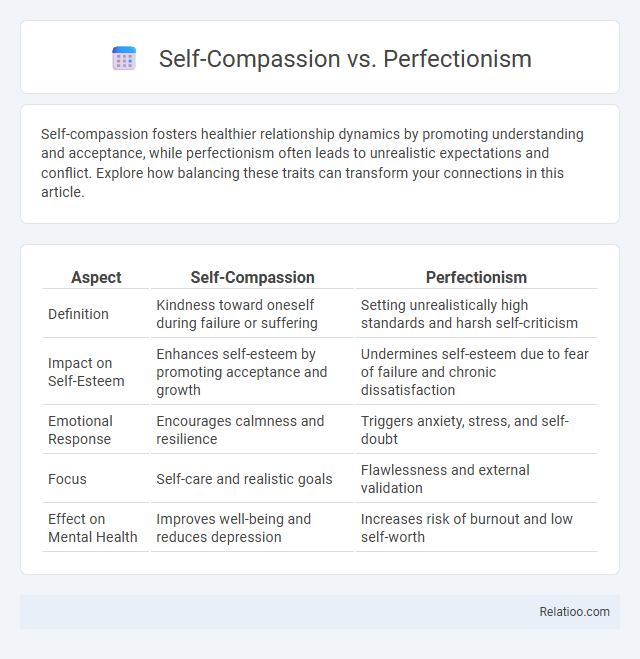Self-compassion fosters healthier relationship dynamics by promoting understanding and acceptance, while perfectionism often leads to unrealistic expectations and conflict. Explore how balancing these traits can transform your connections in this article.
Table of Comparison
| Aspect | Self-Compassion | Perfectionism |
|---|---|---|
| Definition | Kindness toward oneself during failure or suffering | Setting unrealistically high standards and harsh self-criticism |
| Impact on Self-Esteem | Enhances self-esteem by promoting acceptance and growth | Undermines self-esteem due to fear of failure and chronic dissatisfaction |
| Emotional Response | Encourages calmness and resilience | Triggers anxiety, stress, and self-doubt |
| Focus | Self-care and realistic goals | Flawlessness and external validation |
| Effect on Mental Health | Improves well-being and reduces depression | Increases risk of burnout and low self-worth |
Understanding Self-Compassion: A Definition
Self-compassion involves treating yourself with kindness and understanding during moments of failure or difficulty, contrasting sharply with perfectionism's relentless demand for flawlessness. While perfectionism drives you to set unrealistically high standards often leading to self-criticism, self-compassion encourages acceptance and resilience by recognizing that imperfection is a shared human experience. Embracing self-compassion allows your personal growth to flourish without the debilitating pressure of needing to be perfect.
What Is Perfectionism? Key Traits and Challenges
Perfectionism is characterized by an intense striving for flawlessness, accompanied by critical self-evaluations and concerns about others' judgments. Key traits include an insistence on high standards, fear of failure, and difficulty accepting mistakes, which often lead to stress and decreased well-being. Understanding these challenges can help you cultivate self-compassion, offering a healthier perspective and reducing the negative impacts of perfectionism on mental health.
The Origins: Where Do Self-Compassion and Perfectionism Come From?
Self-compassion originates from an internal capacity for kindness and understanding toward oneself, often nurtured through secure attachments and positive role models during childhood. Perfectionism typically stems from external pressures, such as parental expectations, cultural norms, and societal standards that promote flawlessness and high achievement. The contrasting origins explain why self-compassion encourages acceptance of imperfections, while perfectionism drives relentless striving for unrealistic ideals.
Self-Compassion vs Perfectionism: Core Differences
Self-compassion involves treating oneself with kindness and understanding during failures, fostering emotional resilience and mental well-being. Perfectionism drives individuals to set unrealistically high standards, often resulting in self-criticism, anxiety, and fear of failure. Unlike perfectionism's harsh self-judgment, self-compassion promotes acceptance and growth, reducing stress and enhancing motivation.
The Impact of Self-Compassion on Mental Health
Self-compassion significantly buffers the adverse effects of perfectionism by promoting emotional resilience and reducing self-criticism, which are critical factors in managing anxiety and depression. Research from the University of Texas shows that individuals with high self-compassion exhibit lower cortisol levels and enhanced psychological well-being, mitigating perfectionism-driven stress. Integrating self-compassion practices into mental health interventions can decrease perfectionism-related burnout and improve overall emotional stability.
How Perfectionism Affects Well-being and Success
Perfectionism often leads to heightened stress and anxiety, undermining both mental well-being and overall life satisfaction. Your pursuit of flawless results can create unrealistic expectations that hinder productivity and increase the risk of burnout. Embracing self-compassion allows you to acknowledge mistakes without harsh judgment, fostering resilience and sustainable success.
Comparing Self-Talk: Kindness vs. Criticism
Self-compassion involves treating Yourself with kindness and understanding during failures, while perfectionism often triggers harsh self-criticism and unrealistic standards. Perfectionistic self-talk tends to highlight flaws and mistakes, increasing stress and lowering self-esteem, whereas self-compassionate self-talk fosters resilience and emotional well-being. Comparing these, Your inner dialogue reflects either a nurturing support system or an unforgiving judge, significantly impacting mental health and motivation.
Transforming Perfectionist Tendencies with Self-Compassion
Transforming perfectionist tendencies with self-compassion involves replacing harsh self-criticism with kind understanding and acceptance of your imperfections. Research shows that self-compassion reduces anxiety and promotes resilience, allowing you to embrace mistakes as opportunities for growth rather than failures. Cultivating self-compassion enables healthier goal-setting and emotional well-being, breaking the cycle of unrealistic standards common in perfectionism.
Practical Strategies to Cultivate Self-Compassion
Cultivating self-compassion involves embracing practical strategies like mindfulness, self-kindness, and recognizing common humanity to counter the harsh self-criticism often fueled by perfectionism. You can practice writing compassionate self-statements, setting realistic goals, and reframing mistakes as growth opportunities to reduce the paralyzing effects of maladaptive perfectionism. Prioritizing these approaches supports emotional resilience and well-being, helping you maintain motivation without succumbing to unrealistic standards.
Choosing Growth: Why Self-Compassion Outshines Perfectionism
Self-compassion fosters resilience and mental well-being by encouraging acceptance of flaws and learning from mistakes, contrasting sharply with perfectionism's relentless pursuit of unattainable standards that often leads to anxiety and burnout. Research from Kristin Neff highlights that self-compassion promotes healthier motivation and sustained personal growth compared to the fear-driven behaviors typical of perfectionism. Choosing self-compassion over perfectionism cultivates a growth mindset, enabling individuals to embrace challenges and failures as opportunities for development rather than sources of self-criticism.

Infographic: Self-compassion vs Perfectionism
 relatioo.com
relatioo.com